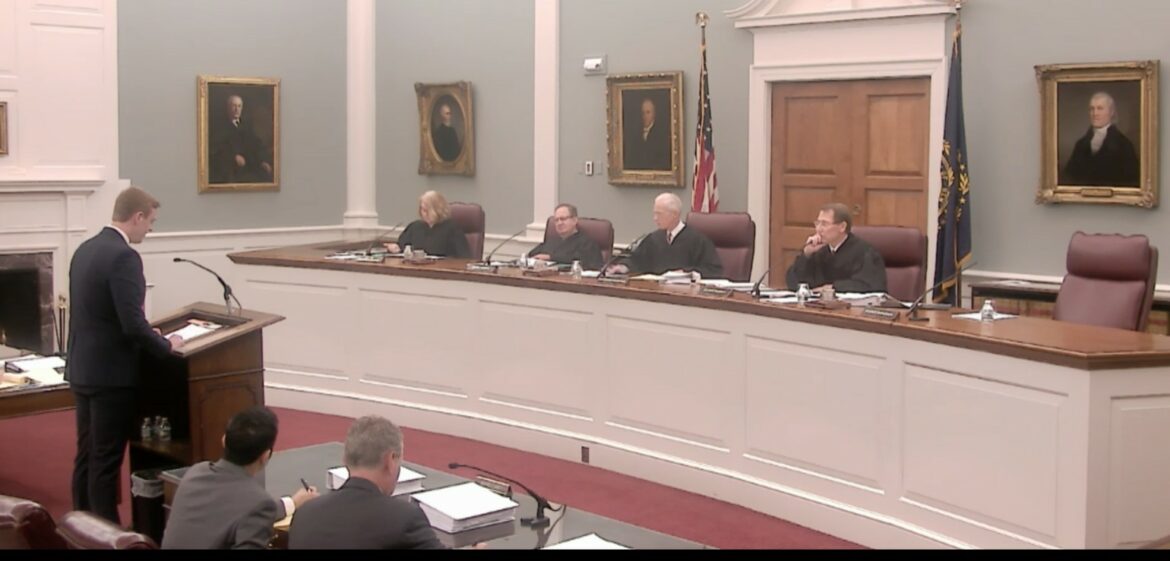By GARRY RAYNO, InDepthNH.org
CONCORD — Redistricting issues do not belong before the courts, the state argued Thursday before the state Supreme Court, saying instead the process belongs with the legislature.
But the attorney for a group of Democratic New Hampshire citizens said the court has dealt with these issues many times in the past, the most recent last fall when it hired a special master to redraw the state’s two Congressional districts when there was an impasse.
The Supreme Court heard oral arguments in the fight over what the plaintiffs claim are gerrymandered Executive Council and state Senate districts.
The case was appealed to the Supreme Court after a superior court judge dismissed the case saying there is nothing in the state constitution that forbids gerrymandering, and it is solely the legislative purview not the courts.
But Thursday the attorney for the Democrats argued gerrymandering dilutes the votes of one party when maps have been drawn to determine who the winners will be, and that negates equal protection under the constitution and violates the free and fair election clause.
Attorney Jonathan Hawley of the Elias Law Group said the court certainly has jurisdiction when the legislature exercises its authority in ways that violate one group’s constitutional protections.
“You do not need to arrive at a clear bright line rule or some mathematical formula to state a viable constitutional claim,” Hawley argued.
But state Solicitor General Anthony Galdieri argued the cases cited by the plaintiffs for court jurisdiction are different from the one before the court today.
He said the plaintiffs argue the districts need to be competitive, which is not one of the standards in the constitution or law.
Galdieri said that is not something the court can determine because there is no standard.
But what about the free and fair election clause in the constitution, asked Justice Gary Hicks.
Galdieri said you have to identify the constitutional provision it comes from. “To what extent is it a political consideration,” he said.
Hicks went back and forth over situations that Galdieri believes the court could take up and what it should not.
Galdieri said the court would have to decide if districts were competitive or what deviation for each district would be acceptable.
But Justice James Bassett said the trial court never got to those issues before the case was truncated and noted those are precisely what the trial court should have done before handing it to the Supreme Court.
“Are you of the position that gerrymandering is never unconstitutional,” Bassett asked Galdieri.
He responded that the remedy does not lie within the judicial branch.
“You have a circular problem,” Bassett said. “Once entrenched, a group does not want to give up power. To say the solution is at the ballot box, overlooks that reality.”
Galdieri said voters can decide to hold a constitutional convention and decide on the issue.
He said the court would have to define a competitive district and the judicial process used to arrive at that end.
Hicks and Bassett questioned Galdieri about his concerns for the court determining if gerrymandering would be unconstitutional in some instances where political consideration drives the process.
They noted making those determinations is what the court does every day.
Galdieri said the redistricting process is reserved for the legislature and goes to the core of its foundation being the most political branch of government.
Earlier Hawley argued the court has stepped into the redistricting process many times before and remanded the issue back to the legislature and has only entered into the redrawing process when there has been an impasse.
Chief Justice Gordon MacDonald said the primary rule to rely on is text and there is no text here.
He said the English Bill of Rights has the equal and fair election clause many states have in their constitutions to protect against dilution of votes.
“Is it proper to consider history,” MacDonald asked.
Galdieri said it was included in the English Bill of Rights to protect against intimidation by a King or opening and closing polls at will, but not to establish voting districts.
“It goes to the point of history why our constitution has the function rest with the legislature and not another branch,” Galdieri said. “It may be the lesser of two evils.”
But Hawley argued each citizen’s vote should have equal weight and this case is about the dilution of one group’s vote.
When election results have been predetermined for one party, office holders are no longer responsible to voters, he said. One group of voters have little opportunity to elect their representative, he said.
“Many constitutional standards don’t come with bright lines,” Hawley said. “(The question is) what did the legislature do, and why did they do it and what are the consequences of what it did to voters.”
He said the plaintiffs are alleging the district lines were drawn with the intent of partisan gain and to shut one group out of the legislative process.
He said the plaintiffs have already demonstrated that the Executive Council and State Senate districts are outliers with more than 99 percent of the alternatives less harmful.
Bassett said, so you are saying some partisan consideration is constitutional, but you can go too far.
Hawley said when you dilute the rights of a group of voters that is unconstitutional.
Bassett asked if the plaintiffs were asking the court to remand the issue back to the superior court.
Hawley said they are asking the courts to block using the two new redistricting maps in any future election and would discuss remedies down the road.
The National Redistricting Foundation is working on the case along with local attorneys.
“New Hampshire voters have always been closely divided between both political parties in statewide races, and, as a result, New Hampshire is a highly competitive state. The maps should reflect the will of the voters, not the will of partisan agendas,” said Olivia Mendoza, Director of Litigation and Policy for the NRF. “It is the responsibility of the Court to protect the constitutional rights of all Granite Staters in order to allow equal voting power in elections.”
The original suit claims the redrawn districts approved by the Republican controlled legislature and signed by GOP Gov. Chris Sununu, were politically gerrymandered to give their party an overwhelming majority in the Senate and Executive Council which disenfranchises Democrats with more registered voters in the state than Republicans.
They claim the newly redrawn districts violate the state constitution’s “free and fair elections” clause as well as the constitution’s equal protection guarantee by denying their right to equal weight of their votes compared to Republicans.
And they also believe the redistricting plans violate the constitution’s guarantee of free speech and association, as the plans discriminate and retaliate against Democrats by diluting their ability to band together and elect candidates of their choice.
The state argued redistricting is the legislature’s purview and that the newly redrawn districts meet all constitutional requirements such as equal population and “one man, one vote” provisions.
Garry Rayno may be reached at garry.rayno@yahoo.com.





